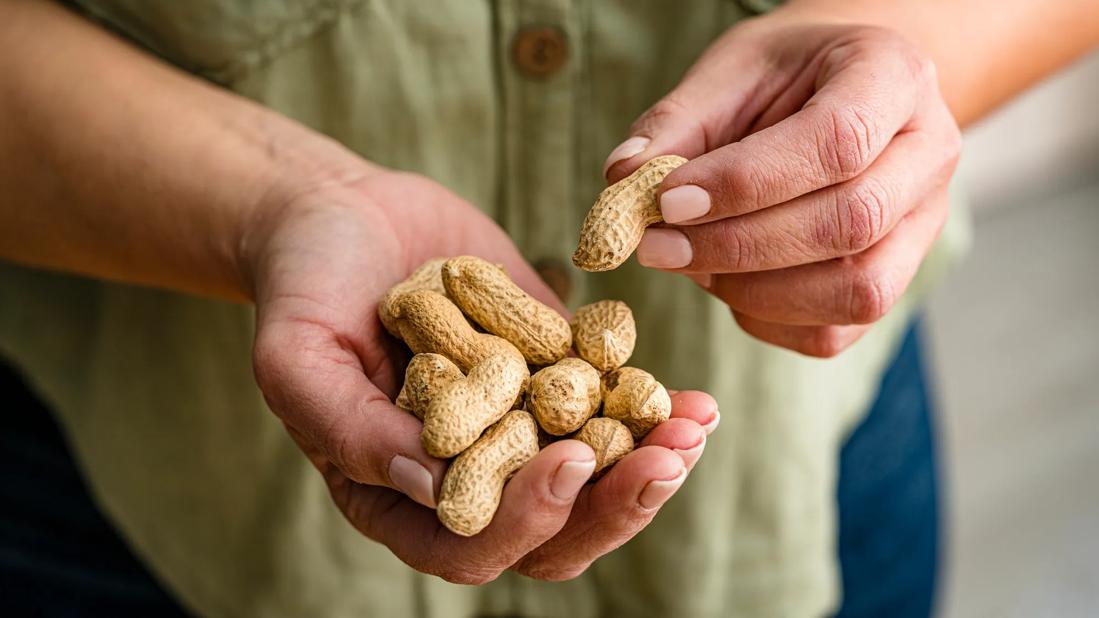
We tend to think of peanuts as nuts — it’s in the name, after all. But they’re actually legumes. They’re in the same family as chickpeas, lentils, peas and soybeans. But whatever we call them, peanuts are an abundant food. And for good reason.
Advertisement
Cleveland Clinic is a non-profit academic medical center. Advertising on our site helps support our mission. We do not endorse non-Cleveland Clinic products or services. Policy
“Peanuts are popular in many cuisines worldwide and in plant-based diets,” says registered dietitian Julia Zumpano, RD, LD. “They’re rich in healthy fats and protein, as well as several vitamins and minerals.”
Zumpano breaks down peanut health benefits.
Peanut nutrition information
An ounce (28 grams) of dry-roasted, without salt peanuts, which is about 28 shelled peanuts, provides:
- 166 calories
- 6 grams carbohydrates
- 0 grams cholesterol
- 14 grams of fat
- 2.4 grams of fiber
- 7 grams of protein
- 1.7 milligrams of sodium
- 1.3 grams of total sugar
An ounce of peanuts also provides these key nutrients:
- 0.1 milligrams of copper (11% daily value or DV)
- 0.5 milligrams of manganese (21% DV)
- 4.08 milligrams of niacin (vitamin B3) (5% DV)
- 1.4 milligrams of vitamin E (9.3% DV)
- 0.043 milligrams thiamine (vitamin B1) (3.5% DV)
- 50.5 milligrams of magnesium (12% DV)
- 0.286 milligrams of pantothenic acid (vitamin B5) (5% DV)
Top health benefits of peanuts
Peanuts are a nutrient-dense food that offer some specific health benefits. Zumpano shares the top reasons why peanuts are good for you.
1. Provides antioxidants
Antioxidants neutralize free radicals in your body. Free radicals are molecules that, in excess, can damage your cells in a process called oxidative stress. This damage plays a part in many disease processes and is thought to be what contributes to higher risk of chronic diseases.
Advertisement
“Antioxidants, like those found in peanuts, may help reduce the risk of a wide range of chronic diseases,” says Zumpano.
Peanuts are packed full of plant compounds and mineral antioxidants, including:
- Coenzyme Q10
- Copper
- Flavonoids
- Manganese
- Resveratrol
- Selenium
- Vitamin E
2. Lowers cholesterol
Eating peanuts and other nuts, like walnuts, almonds, cashews and pistachios, may help lower your cholesterol. The cholesterol-lowering property of peanuts may be due in part to their phytosterols.
“Phytosterols are compounds found in plants, and they’re similar in structure to cholesterol. When you eat phytosterols, they block the absorption of cholesterol in your digestive system, which can lower cholesterol levels,” explains Zumpano.
3. Helps with weight management
Even though peanuts are high in calories, research suggests that eating peanuts may help you maintain a healthy weight and avoid having obesity. “Peanuts also contain protein, fiber and healthy fats, which can make you feel full quicker and longer,” notes Zumpano.
Peanuts might even make weight loss more pleasant if you’re not a fan of low-fat diets, according to a study of people cutting calories to lose weight. Those who ate 1 ounce of peanuts before two meals each day lost around the same amount of weight as those on a low-fat diet.
4. Aids glycemic control
All nuts help keep blood sugar steady, as they’re rich in fiber and protein and low in carbs. But what’s going on at a cellular level? A review of 40 different experiments found that eating peanuts and tree nuts may improve your insulin sensitivity. This means your body can use insulin more effectively.
But consuming peanuts isn’t likely to lower blood sugar directly. Rather, regularly eating peanuts is more likely to help prevent blood sugar problems in the long run.
“Normal blood sugar levels are a cornerstone to good health and lowering your risk of many chronic diseases,” says Zumpano.
What are the health benefits of peanut butter?
Peanut butter is easily the most popular of all the nut butters. But is it healthy?
“In general, peanut butter has most of the same health benefits as peanuts,” reports Zumpano. “However, popular brands of peanut butter also contain added sugar and salt, which makes peanut butter less healthy than plain peanuts. To maximize the health effects, look for no-sugar, low-salt brands.”
Beware of peanut allergies
Peanut allergies are common. This allergy response happens when your immune system mistakenly identifies the proteins in peanuts as harmful substances. These allergic reactions can be severe and even life-threatening for some people. Anyone with a peanut allergy should avoid peanuts, peanut butter and any foods that contain them.
Advertisement
